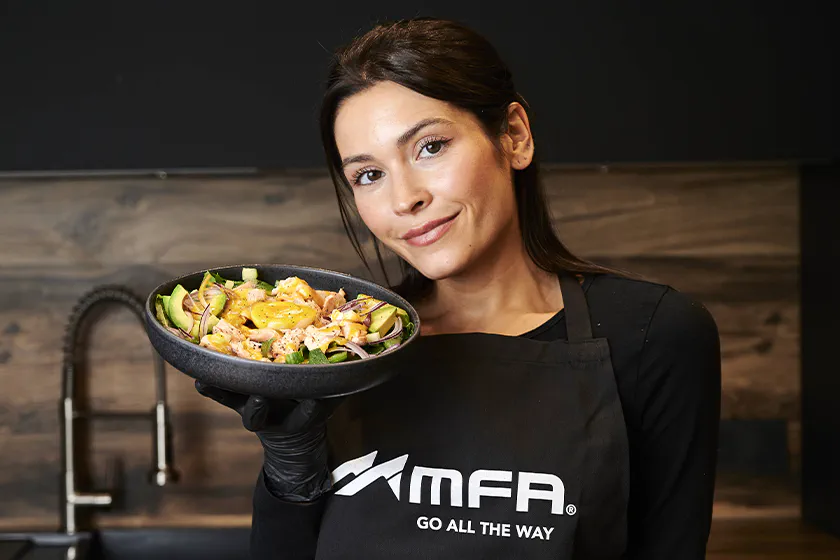Stop Stress Eating: Tips to Manage Emotions Without Food

Mindful strategies to break the cycle
It’s been a long, rough day. You come home from your toxic job, tired, frazzled, and hungry with NO energy to hit the gym or cook. You see the Ben & Jerry’s in the freezer and decide to have just one bite to tide you over until DoorDash arrives.
The next thing you know, almost as if you were possessed by some ice cream-loving demon, you’ve scarfed down an entire container of Chunky Monkey!
If this sounds like you, then you may be prone to emotional eating—a common way people cope with their emotions and a major barrier to weight loss.
Here’s why you might be prone to eating your feelings and how to stop this habit from sabotaging your fitness goals.
What is Emotional Eating?
People eat for a variety of reasons, real physical hunger is just one of them. Sometimes, you might eat because you’re bored or lonely, or because you caught a whiff of something delicious.
People who are going through major life challenges, like a divorce or job stress, might be especially vulnerable to drowning their sorrows in Ben & Jerry’s.
Food can also be a reward or a celebration. Just got a raise? Get the gang together at your favorite Thai restaurant. Food is a lot more than just fuel to keep our bodies moving.
The problem is that nobody ever binge eats carrot sticks or salad. If you are prone to emotional eating you are probably overeating and you are probably eating a lot of foods that are high in calories and sugar. This can pack the pounds on where you don’t want them.
Plus, the relief you experience from this behavior is usually short-lived. Not only do your problems remain unchanged, but now you’ve got a new one— weight gain.
Stress eating can be an unconscious habit that is hard to break. A lot of times, we’re totally zoned out when we are snacking. For instance, have you ever absentmindedly had a few chips while you were putting away the groceries?
Or maybe you nibble on food while you’re cooking dinner? We may not give such behaviors much thought. But they add up — to extra pounds on your behind.
How to Stop Emotional Eating
Get Mindful
In order to break a bad habit you have first become aware of when it occurs. This is where tracking your mood and keeping a food diary could help. For a few days, write down or use an app to record everything you put in your mouth.
You might be surprised at how much you are actually eating. Pay attention to what you are feeling when you snack. Are there any environmental cues that are associated with this behavior? Any patterns?
For instance, does it happen at a specific time of day? Are you stressed or bored? What are the circumstances? Is it more likely to occur when you are alone or late at night?
Get curious about your own behavior. The next time you want to dive deep into the Häagen-Dazs, ask yourself why. Why am I doing this? What do I want right now?
Maybe it’s not food you want but stress relief, a break from boredom, a reward, or a hug. What role is food playing in your life?
Find an Appropriate Substitute for Food
Once you’ve identified why and when your Twinkie binges keep happening, find an appropriate substitute for your sugary treat.
For instance, if you know you eat out of boredom, then find some fun activities. If you know it’s about stress, try going for a walk or calling a friend.
You have been using food to manage your emotions, now you have to come up with a way of meeting your needs that doesn’t involve Dominos.
Bottom Line
Emotional eating can be an unconscious way to cope with uncomfortable feelings. A lot of us use food to soothe or suppress negative emotions. Keeping a food and mood diary can help reduce this habit.
Get clear about what is triggering your desire to stress-eat and develop healthier coping strategies. Whether it’s practicing mindfulness, engaging in physical activity, or taking a bubble bath, small changes can lead to lasting improvements in your relationship with food.
Kaye Smith, PhD, is a seasoned behavioral health coach and psychologist with a specialization in women’s sexual health. With 20+ years of experience spanning psychotherapy, academia, and content development, she supports women managing anxiety, depression, stress, and menopause. Dr. Smith has contributed to the work of renowned sexologist Dr. Betty Dodson and written for platforms including Hello Clue, O.school, and Medium. Leveraging expertise in CBT, mindfulness, and motivational interviewing, she delivers clear, evidence-based insights on mental health and wellness.



